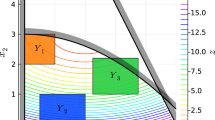
Overview
Part of the book series: Operations Research/Computer Science Interfaces Series (ORCS, volume 5)
Access this book
Tax calculation will be finalised at checkout
Other ways to access
About this book
Logic-based methods for modelling and solving combinatorial problems have recently started to play a significant role in both theory and practice. The application of logic to combinatorial problems has a dual aspect. On one hand, constraint logic programming allows one to declaratively model combinatorial problems over an appropriate constraint domain, the problems then being solved by a corresponding constraint solver. Besides being a high-level declarative interface to the constraint solver, the logic programming language allows one also to implement those subproblems that cannot be naturally expressed with constraints. On the other hand, logic-based methods can be used as a constraint solving technique within a constraint solver for combinatorial problems modelled as 0-1 integer programs.
Similar content being viewed by others
Keywords
Table of contents (11 chapters)
-
Front Matter
-
Back Matter
Authors and Affiliations
Bibliographic Information
Book Title: Logic-Based 0–1 Constraint Programming
Authors: Peter Barth
Series Title: Operations Research/Computer Science Interfaces Series
DOI: https://doi.org/10.1007/978-1-4613-1315-1
Publisher: Springer New York, NY
-
eBook Packages: Springer Book Archive
Copyright Information: Kluwer Academic Publishers 1996
Hardcover ISBN: 978-0-7923-9663-5Published: 30 November 1995
Softcover ISBN: 978-1-4612-8564-9Published: 30 September 2011
eBook ISBN: 978-1-4613-1315-1Published: 06 December 2012
Series ISSN: 1387-666X
Series E-ISSN: 2698-5489
Edition Number: 1
Number of Pages: XIV, 254
Topics: Operations Research/Decision Theory, Artificial Intelligence, Optimization



